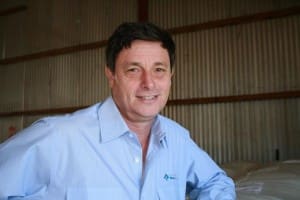Australian Wool Network is hoping its acquisition of Victorian knitwear manufacturer Hysport will enable it to pay genuine price premiums to woolgrowers, AWN managing director John Colley said.
The acquisition would also allow AWN and woolgrowers to be involved in creating consumer demand for wool under an “Australian Made’’ logo, accessing the world’s second fastest growing retail sector — airports.
But initially, the development will give AWN’s woolgrower clients new platforms to trade wool and provide a channel for feedback to growers from the retail level.
Hysport’s pure wool and wool blend Merinosnug and Emaroo products are marketed directly to overseas tourists through contracts with the world’s largest airport retailer Lagardere, Mr Colley said.
Lagardere also owns the airport retail outlets, Purely Merino, Purely Australian and Australian Made.
“We are the largest supplier of woollen goods to them and they would like to see the Purely Merino brand go worldwide to all of their airports in the 25 countries that they operate in,” Mr Colley said.
“And by doing that we are going to expand our business and go with them, on the back of contracts.
“So it is genuine opportunity to drive into the second biggest growing retail space in the world, after online,” he said.
“When you look at all the world’s airports there is very little wool marketed in them.
“We think it is a great opportunity and it was one of the reasons we purchased Hysport in the first place because there is an opportunity to genuinely grow the demand, to invest in Australian-made and to take money out of the pipeline and deliver better returns to growers.”
AWN to become vertically integrated
AWN is owned by Australian Pastoral Investments shareholders, Mr Colley and his partner, AWN chairman and Yass woolgrower Brendon Lunney. The company was established in 1999 and ranks as Australia’s third largest wool broker, marketing more than 235,000 bales of wool a year for over 5000 growers.
The acquisition will allow AWN to move from brokerage services to vertically integrated wool marketing throughout the pipeline.
“We believe we will be in a position because of our relationships to actually cut some of the margins down the line and we plan to hand those back to our growers wherever possible.”
Grower contracting to expand
Mr Colley said AWN already contracted wool from growers for overseas clients and would be contracting to supply Hysport product ranges.
“I actually don’t know why there isn’t a lot more contracting because with the wool price at even 1150 cents for 21 microns there is good money in it providing you are running a good sheep and wool operation.”
Hysport has been buying mainly 17-24 micron wool and Mr Colley said future Hysport product lines would continue to be structured around Merino types, though there are plans to extend the company’s wool usage at the finer end.
Certain types of wool could be made to specification for speciality products and programs, he said.
“We will be going down to 16 micron and we are already trialling several other different superfine and 24 micron types.”
Wool has continued to lose market share
Mr Colley said Australian wool manufacturing has always struggled, but the Hysport model was working because of investment in state-of-the-art equipment. But he said wool prices have continued to move down although Australia’s production had also fallen from nearly 4 million bales of wool to 1.8 million bales over the past 35 years.
“When you look at inflation the wool prices have gone down.
“So whatever marketing we’ve been doing over a 30-year period – whatever spin you put on it – it hasn’t worked, because the textile industry has actually got bigger.
“It doesn’t matter what anybody says it just hasn’t worked over a long period of time and there have been several organisations that have bene responsible for it.
“They have never been accountable and had we even maintained market share in the textile industry at three per cent then wool and sheep would still be king in Australia.””
Mr Colley also owns a 10,000 sheep operation.
“When I look at it from a woolgrower’s perspective and I wonder where my money is going and what it is doing.
“Would I rather invest it with someone that is more commercial like me? The answer to that question is ‘yes’.”
Hysport purchase connects growers to consumers
Mr Colley said AWN had spent the past year investigating ways to add value to wool growing businesses and proactively drive demand for client’s wool.
“Hysport provides us with a reliable means to deliver a genuine connection throughout the wool processing pipeline from wool grower to consumer,’’ he said.
“One of the key attributes of Hysport, and a significant factor in our deliberations to secure the business, was the many exclusive and large contracts for certain product types in already established international markets.
“We can now offer an ever greater commitment to Australian grown, made and exported wool through business integration,’’ Mr Colley said.
“This will help drive demand for our client’s wool by bringing wool growers, processors and consumers together.’’
Hysport one of Australia’s largest knitters
Hysport chief executive officer Rod Murray said the factory ranked among the two largest knitwear manufacturers in Australia and used “whole garment’’ (seamless) technology.
Mr Murray said there had been no contact between woolgrowers and Hysport in the past, with wool sourced on micron specification only.
“We can now have more detail on the wool including fibre length and crimp – our products require a micron range of 17-24,’’ he said.
“The alliance with AWN has enabled me to attend my first wool auction and on-farm visits with wool growers are planned.’’


HAVE YOUR SAY